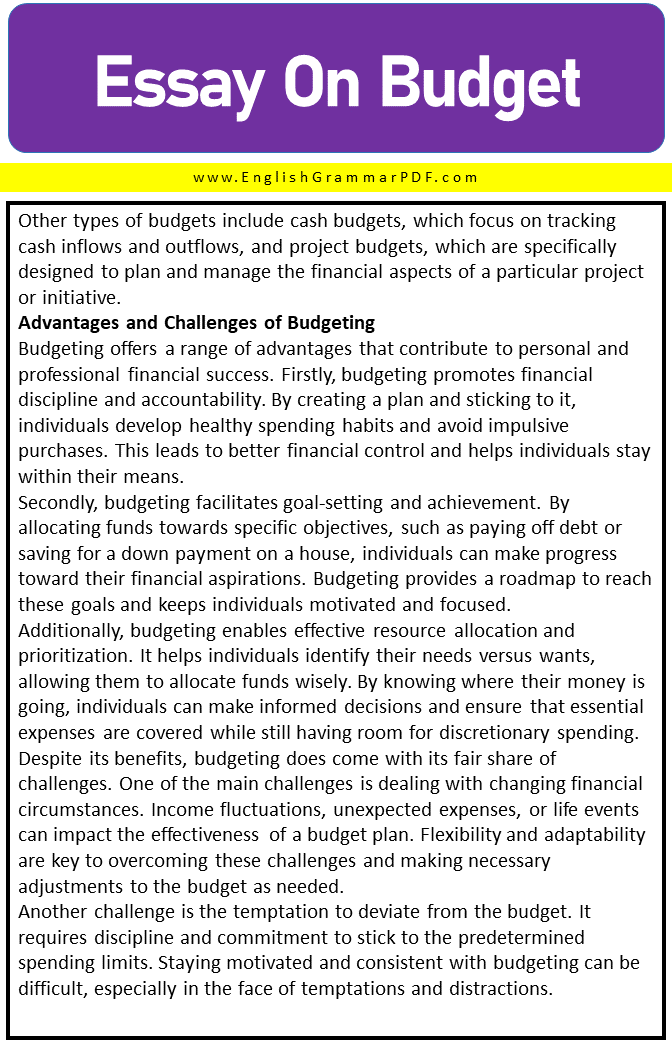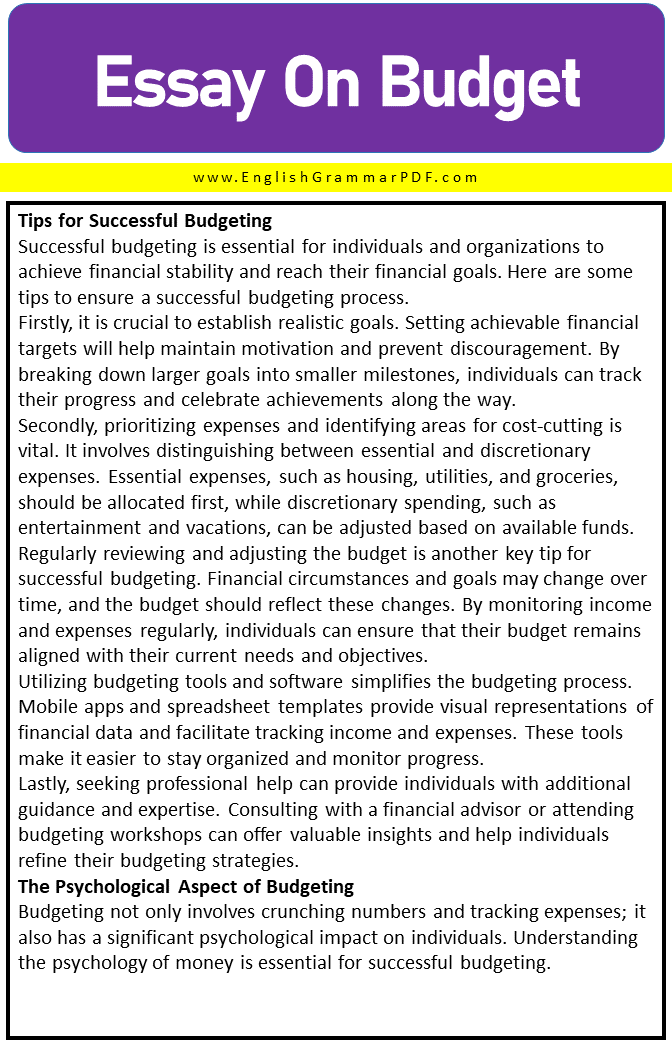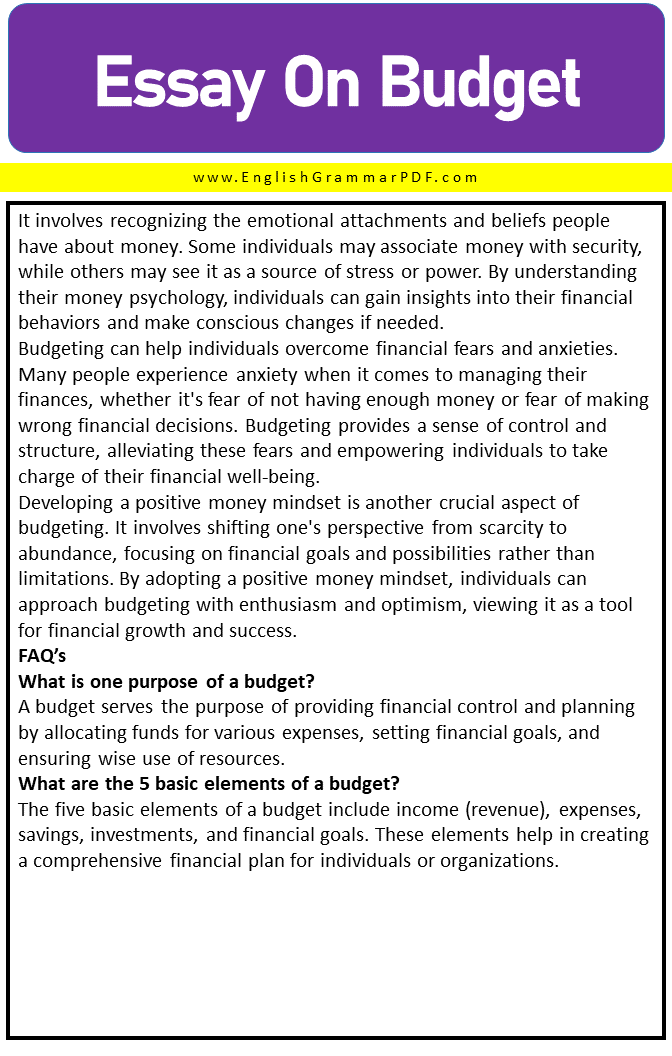Essay On Budget
Outline of Essay:
- Introduction
- The Basics of Budgeting
- Types of Budgets
- Advantages and Challenges of Budgeting
- Tips for Successful Budgeting
- The Psychological Aspect of Budgeting
Introduction
A budget is a financial plan that outlines an individual’s or an organization’s income and expenses for a specific period. Budgeting holds immense importance in both personal and professional contexts as it provides a roadmap for financial stability and success. This essay aims to explore the various aspects of budgeting, its types, advantages and challenges, tips for successful implementation, its role in financial growth, and the psychological impact it has on individuals. By understanding the significance of budgeting, individuals can make informed financial decisions, achieve their goals, and reduce financial stress.
The Basics of Budgeting
At its core, budgeting involves understanding income and expenses. Income refers to the money an individual or organization earns, such as wages, salaries, investments, or business revenue. On the other hand, expenses encompass various financial obligations and expenditures, including rent or mortgage payments, utility bills, groceries, transportation costs, and entertainment expenses.
Creating a budget plan involves several steps. First, individuals or organizations must identify their sources of income accurately. This helps in understanding the available funds to allocate toward different expenses. Tracking expenses is crucial to gain insights into spending patterns and identify areas where cost-cutting is possible.
Furthermore, setting financial goals within the budget plan allows individuals or organizations to work towards specific objectives, such as saving for a down payment on a house or investing in business expansion. The benefits of budgeting are multifold.
It enhances financial control by providing a clear overview of income and expenses. Improved decision-making stems from a better understanding of financial resources and their allocation. Additionally, budgeting reduces financial stress as it offers a sense of security and stability.
Types of Budgets
There are various types of budgets that individuals and organizations can utilize to manage their finances effectively. Understanding these different budget types allows for a tailored approach to financial planning and goal-setting. The two main types of budgets are personal budgets and business budgets.
Personal budgets are designed for individuals to track and manage their finances. They involve creating a budget plan that outlines income sources, such as salaries, investments, or rental income, and categorizing expenses into different categories like housing, utilities, transportation, groceries, and discretionary spending. Personal budgets help individuals prioritize their expenses, allocate funds towards savings or debt repayment, and plan for future financial goals like buying a house or saving for retirement.
On the other hand, business budgets are essential for organizations to effectively manage their financial resources. Business budgets consist of revenue projections, expense allocations, and investment planning.
They help businesses set financial targets, allocate funds to different departments or projects, and monitor cash flow. Business budgets enable organizations to make informed decisions, ensure profitability, and assess the financial feasibility of new ventures or expansions.
Other types of budgets include cash budgets, which focus on tracking cash inflows and outflows, and project budgets, which are specifically designed to plan and manage the financial aspects of a particular project or initiative.
Advantages and Challenges of Budgeting
Budgeting offers a range of advantages that contribute to personal and professional financial success. Firstly, budgeting promotes financial discipline and accountability. By creating a plan and sticking to it, individuals develop healthy spending habits and avoid impulsive purchases. This leads to better financial control and helps individuals stay within their means.
Secondly, budgeting facilitates goal-setting and achievement. By allocating funds towards specific objectives, such as paying off debt or saving for a down payment on a house, individuals can make progress toward their financial aspirations. Budgeting provides a roadmap to reach these goals and keeps individuals motivated and focused.
Additionally, budgeting enables effective resource allocation and prioritization. It helps individuals identify their needs versus wants, allowing them to allocate funds wisely. By knowing where their money is going, individuals can make informed decisions and ensure that essential expenses are covered while still having room for discretionary spending.
Despite its benefits, budgeting does come with its fair share of challenges. One of the main challenges is dealing with changing financial circumstances. Income fluctuations, unexpected expenses, or life events can impact the effectiveness of a budget plan. Flexibility and adaptability are key to overcoming these challenges and making necessary adjustments to the budget as needed.
Another challenge is the temptation to deviate from the budget. It requires discipline and commitment to stick to the predetermined spending limits. Staying motivated and consistent with budgeting can be difficult, especially in the face of temptations and distractions.
Tips for Successful Budgeting
Successful budgeting is essential for individuals and organizations to achieve financial stability and reach their financial goals. Here are some tips to ensure a successful budgeting process.
Firstly, it is crucial to establish realistic goals. Setting achievable financial targets will help maintain motivation and prevent discouragement. By breaking down larger goals into smaller milestones, individuals can track their progress and celebrate achievements along the way.
Secondly, prioritizing expenses and identifying areas for cost-cutting is vital. It involves distinguishing between essential and discretionary expenses. Essential expenses, such as housing, utilities, and groceries, should be allocated first, while discretionary spending, such as entertainment and vacations, can be adjusted based on available funds.
Regularly reviewing and adjusting the budget is another key tip for successful budgeting. Financial circumstances and goals may change over time, and the budget should reflect these changes. By monitoring income and expenses regularly, individuals can ensure that their budget remains aligned with their current needs and objectives.
Utilizing budgeting tools and software simplifies the budgeting process. Mobile apps and spreadsheet templates provide visual representations of financial data and facilitate tracking income and expenses. These tools make it easier to stay organized and monitor progress.
Lastly, seeking professional help can provide individuals with additional guidance and expertise. Consulting with a financial advisor or attending budgeting workshops can offer valuable insights and help individuals refine their budgeting strategies.
The Psychological Aspect of Budgeting
Budgeting not only involves crunching numbers and tracking expenses; it also has a significant psychological impact on individuals. Understanding the psychology of money is essential for successful budgeting.
It involves recognizing the emotional attachments and beliefs people have about money. Some individuals may associate money with security, while others may see it as a source of stress or power. By understanding their money psychology, individuals can gain insights into their financial behaviors and make conscious changes if needed.
Budgeting can help individuals overcome financial fears and anxieties. Many people experience anxiety when it comes to managing their finances, whether it’s fear of not having enough money or fear of making wrong financial decisions. Budgeting provides a sense of control and structure, alleviating these fears and empowering individuals to take charge of their financial well-being.
Developing a positive money mindset is another crucial aspect of budgeting. It involves shifting one’s perspective from scarcity to abundance, focusing on financial goals and possibilities rather than limitations. By adopting a positive money mindset, individuals can approach budgeting with enthusiasm and optimism, viewing it as a tool for financial growth and success.
FAQ’s
What is one purpose of a budget?
A budget serves the purpose of providing financial control and planning by allocating funds for various expenses, setting financial goals, and ensuring wise use of resources.
What are the 5 basic elements of a budget?
The five basic elements of a budget include income (revenue), expenses, savings, investments, and financial goals. These elements help in creating a comprehensive financial plan for individuals or organizations.
Download the PDF of the Essay:
Explore More Essays:








